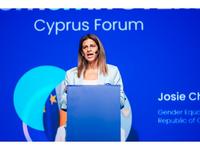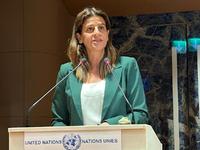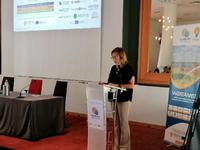Press Releases
05-10-2023 14:47
Opening speech by the Commissioner for Gender Equality, Ms Josie Christodoulou, at the “Training on women’s entrepreneurship and contribution to the economy in the MENA region” event
I would like to ask you to take 20 seconds and think what would happen if, for a day, women decide to stop working and at the same time pause from doing the housework and taking care of children, the elderly and people with disabilities. The economy would collapse.
Welcome to Cyprus and thank you for participating in the training on women’s entrepreneurship and contribution to the economy in the MENA regions, co-organised by the Republic of Cyprus and UNIDO. Special thanks to the Ministry of Foreign Affairs for mainstreaming gender in foreign policy in practice, one of many examples. Special thanks to UNIDO, of course, for the long-term support on the issue. Where there is a will, there is always a way.
A few days ago, I was at a social gathering, socialising around the table. At one moment, I caught myself thinking about my pending work and said it out loud. One of the issues I raised was the preparation of today’s welcoming speech. And there it goes - a question by one person at the table.
“Why is it important to empower women financially - what if she chooses to stay home and be a housewife”. My reaction to the question is irrelevant but the answer is clear: The Organisation for Economic Empowerment defines the economic empowerment as the capacity of women and men to participate in, contribute to and benefit from growth processes, in ways that recognise the value of their contribution, respect their dignity and make it possible to negotiate a fairer distribution of the benefits of growth. It also explains that economic empowerment increases women’s access to economic resources and opportunities, including jobs, financial services, property and other productive assets, skill development and market information. I would add to the above that women are becoming more independent. Economic independence can also play a role in the context of violence against women, including economic violence. But to answer the question I was asked: women must have free choices.
Around the world, one in five women have the intention to start a business – and many are successful entrepreneurs (ILO). Women do run successful enterprises, yet persistent gendered inequalities continue to create major disparities in opportunities to start and grow a business. In general, their businesses tend to be smaller than those run by men, are concentrated in sectors with limited potential for value addition and are over-represented in the informal and care economy.
Women and men entrepreneurs can encounter similar challenges in their economic activities; however, women are faced with an additional set of gender-based barriers that limit their access to resources and opportunities. These challenges are compounded by women’s care responsibilities, which create additional pressure on women entrepreneurs’ time, workload and wellbeing, as well as by unfavorable institutional environments.
A full picture of numbers in the MENA region will be provided by UNIDO during the next session. Cyprus is ranked 22nd among 27 members states of the EU with regards to gender equality. An area where we lag behind, according to the European Institute for Gender Equality, is women’s personal time. Women do not enjoy sufficient personal time and this is due to persistent stereotypes and prejudices which impose multiple roles on women: women “must” be active in the labor market and care for children, the elderly, and people with disabilities. In other words, our society demands that women act as the gatekeepers of the care economy and do the unpaid work. This also results in lack of personal time, which has been identified by the European Institute for Gender Equality as one of the many barriers for women’s full participation in the work force, let alone the initiate to start a business. We must continue working towards breaking stereotypes and explore ways to distribute responsibilities in the care economy, the unpaid economy, equally. At the same time, we need to promote equal participation of women and men in entrepreneurship.
Although we lack statistics in Cyprus with regards to the ownership of business by both women and men, including as shareholders, I can share what we know by experience and by listening to women, listening to their stories. Herstory. We, as all over the world, have a good network (in numbers) of women entrepreneurs. We do have with us today women from the Cyprus Chamber of Commerce, who recently created their own network, and we have with us women from the BPW (Business and Professional Women), who I am sure will add to the discussions based on their own experiences. At the same time, dear friends, when we think of business, and as we know how unconscious biases intervene, business is not only about men or women wearing suits and working behind an office and participating to networking events. Business, entrepreneurship, can take different forms. What our Office identified is that there are many women entrepreneurs living in rural areas, creating and selling local products or being active as farmers, but never recognised as such in the formal economy. When discussing with them, we have identified the need to train them on financial and technological skills that will enable them to be active entrepreneurs within their own field of expertise.
To this extend, we have started planning specific actions that will also be included in our National Strategy for Gender Equality 2024-2026. The first step in order to empower women in rural areas and ensure, among others, their economic independence, is to create training programs for digital and financial skills.
Towards this direction, our Office, in collaboration with the Ministry of Agriculture, the Deputy Ministry of Research, Innovation and Digital Policy, the Commissioner for the Environment and the Cyprus Youth Organisation, will design tailored made programs, after we go on location, meet and talk to the women working in rural areas. It is time that we step out of our offices and go to them, instead of asking them to come to us.
Furthermore, in collaboration with the Deputy Ministry of Tourism and the Deputy Ministry of Culture, we have put as a priority to highlight the role of women working in rural areas, with regards to their invaluable input in shaping Cyprus’ culture and tradition.
The work of women in rural areas needs to be elevated and to become visible. The multiple roles assigned to women, and their invisible contribution for so many decades to the economy, must be replaced with recognition, visibility, and removal of any barriers that make it difficult for them to participate in equal terms in all areas of life.
I am fully aware of the fact that these efforts are not an easy task. They are, however, imperative, so that we can collectively contribute to the fight against female poverty, the sustainable development of societies and above all the wellbeing of these women.
We are very well aware that business women face a number of barriers and discrimination.
Gender inequality in the workplace can take different forms, such as unequal pay (currently at 9.9% in Cyprus), disparity in promotions, and sexual harassment, usually by someone in a position of power. The Ministry of Labor, in its effort to create a more human centered business model, is currently conducting an in-depth analysis on salaries, including gender-based pay discrepancies. At the same time, we are launching a strategic collaboration, for the very first time, with the Cyprus Chamber of Commerce and Industry (CCCI), undertaking three specific actions:
1. The creation of a working Group on Gender Equality, composed of representatives from the Office of the Commissioner and business members of CCCI, with the mandate to promote gender equality in the workplace.
2. Codification of the challenges and obstacles faced by women with regards to their participation in the boards of directors of organisations and their access to leadership positions. Based on the findings, we will proceed to design specific actions with a view to removing those obstacles.
3. The strengthening of cooperation with companies towards eliminating gender-based pay gap. In this direction, we will cooperate with 10 companies, members of CCCI, with 50-150 employees. The aim is to assist them in the creation of annual gender equality working plans. We must also have in mind that Cyprus must soon transpose the pay transparency directive, a tool that will further assist in securing equal pay.
It is true that we cannot be what we cannot see. The need to promote women role models in business is urgent. Unfortunately, there is no sector with gender balance.
In education, for example, teachers and cleaners are, in their majority, women, whereas in high-ranking positions we see more men. In blue professions, including STEAM professions, we see mostly men. It is the same in diplomacy. In business, boards of directors are dominated by men, and, yes there are some businesses that are still considered “boys clubs.” This is the result of gender stereotypes and prejudices, rather than lack of skills. Women and men are equally competent and skilled. Research shows that by far more women than men complete tertiary education, but then they somehow magically disappear.
It is true that in the STEAM field and blue professions we need to attract more women and men, as we rank lowest among EU countries. We must first and foremost start from our educational system, by breaking stereotypes and guiding both girls and boys to choose professions based on their skills rather than on stereotypes. We must, therefore, connect our educational system with the economy. But we must do so away from stereotypes. To this end, our Office, in collaboration with the Ministry of Education, Youth and Sport and the Deputy Ministry of Research and Innovation, is launching a campaign titled “herstory: the steam edition” aiming to promote women as role models in the field. Furthermore, in collaboration with the Deputy Ministry of Shipping, we will be soon launching a mapping survey aiming to gain a better understanding of the lack of women in the field of shipping and blue professions. Once we identify the obstacles, we will proceed to design specific measures in order to promote blue professions to both women and men.
At the same time, we must create a friendly environment for both women and men, and promote role models in the field. It is time for the public and private sectors to work jointly and not in parallel.
In closing, I would like to underline that gender equality is not the problem, but the solution. Women’s economic independence is the way forward to a more just, healthy society and a stronger economy.
(AP/SCH)
Relevant Press Releases

.jpg)
.jpg)
.jpg)
.jpg)






